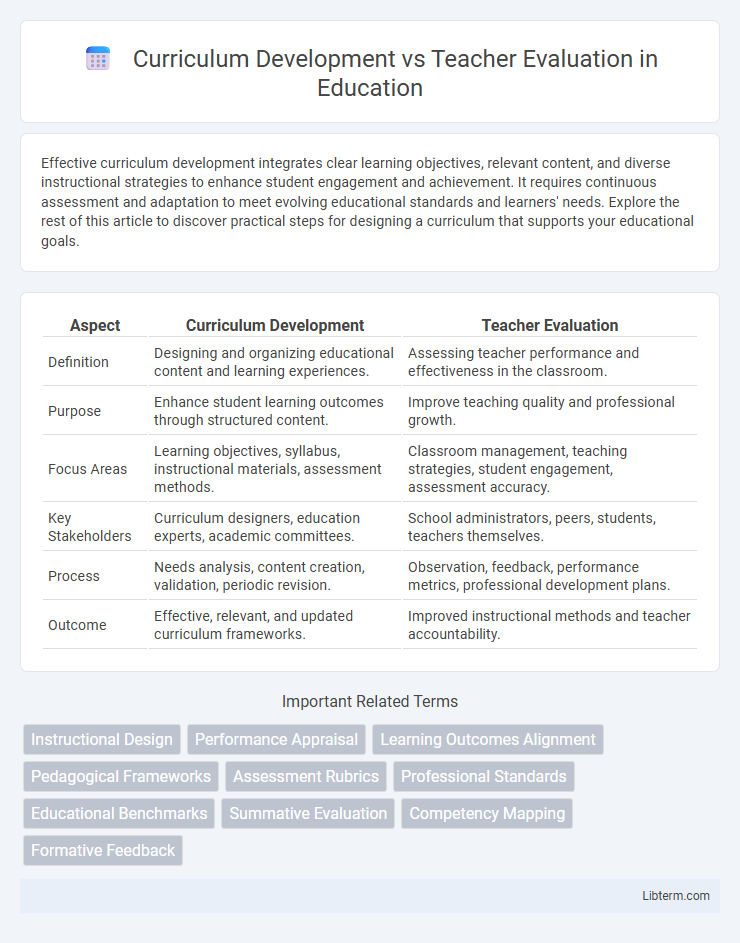Effective curriculum development integrates clear learning objectives, relevant content, and diverse instructional strategies to enhance student engagement and achievement. It requires continuous assessment and adaptation to meet evolving educational standards and learners' needs. Explore the rest of this article to discover practical steps for designing a curriculum that supports your educational goals.
Table of Comparison
| Aspect | Curriculum Development | Teacher Evaluation |
|---|---|---|
| Definition | Designing and organizing educational content and learning experiences. | Assessing teacher performance and effectiveness in the classroom. |
| Purpose | Enhance student learning outcomes through structured content. | Improve teaching quality and professional growth. |
| Focus Areas | Learning objectives, syllabus, instructional materials, assessment methods. | Classroom management, teaching strategies, student engagement, assessment accuracy. |
| Key Stakeholders | Curriculum designers, education experts, academic committees. | School administrators, peers, students, teachers themselves. |
| Process | Needs analysis, content creation, validation, periodic revision. | Observation, feedback, performance metrics, professional development plans. |
| Outcome | Effective, relevant, and updated curriculum frameworks. | Improved instructional methods and teacher accountability. |
Defining Curriculum Development
Curriculum development involves the systematic planning, designing, and organizing of educational content and learning experiences to meet specific academic goals and standards. This process integrates subject matter expertise, pedagogical strategies, and assessment methods to ensure effective knowledge transfer and skill acquisition. Unlike teacher evaluation, which assesses educator performance, curriculum development centers on creating and refining instructional frameworks to enhance student learning outcomes.
Understanding Teacher Evaluation
Teacher evaluation is a systematic process aimed at assessing educators' instructional effectiveness, professional growth, and student impact using standardized criteria and multiple data sources such as classroom observations, student performance, and peer reviews. This process provides actionable feedback to enhance teaching quality and supports professional development plans aligned with educational goals. Understanding teacher evaluation is critical for ensuring accountability, improving instructional strategies, and fostering a culture of continuous improvement within schools.
Key Differences Between Curriculum Development and Teacher Evaluation
Curriculum development centers on designing, organizing, and updating instructional content and learning experiences to meet educational standards and student needs. Teacher evaluation focuses on assessing educators' instructional effectiveness, classroom management, and professional growth through observations, student performance, and feedback. The key difference lies in curriculum development targeting the overall educational framework, while teacher evaluation emphasizes individual teacher performance and accountability.
The Role of Curriculum Development in Educational Success
Curriculum development plays a pivotal role in educational success by establishing a structured framework that aligns learning goals with student needs and standardized outcomes. A well-designed curriculum ensures content relevance, skill progression, and effective assessment strategies, thereby enhancing instructional quality and student achievement. Integrating ongoing feedback during curriculum design fosters adaptability, ensuring that education remains responsive to evolving academic standards and diverse learner profiles.
The Importance of Teacher Evaluation for Quality Instruction
Teacher evaluation plays a critical role in enhancing quality instruction by providing systematic feedback that helps educators refine their teaching strategies. Effective evaluation methods assess various dimensions of teaching performance, including classroom management, instructional delivery, and student engagement, ensuring alignment with curriculum goals. Continuous teacher evaluation supports professional growth, directly impacting student learning outcomes and overall educational success.
Integrating Curriculum Development and Teacher Evaluation
Integrating curriculum development and teacher evaluation enhances educational effectiveness by aligning teaching practices with curriculum goals, ensuring consistent student learning outcomes. This integration facilitates the use of curriculum standards as benchmarks in teacher assessments, promoting reflective teaching and targeted professional growth. Combining these processes supports data-driven decision-making, driving continuous improvements in instructional quality and curriculum relevancy.
Challenges in Aligning Curriculum and Teacher Performance
Aligning curriculum development with teacher evaluation presents challenges such as ensuring consistent standards that accurately reflect both curricular goals and teaching quality. Disparities in curriculum interpretation and instructional methods may lead to misaligned performance metrics, complicating fair assessment. Effective integration requires ongoing collaboration between curriculum designers and evaluators to synchronize expectations and outcomes.
Best Practices for Effective Curriculum Development
Effective curriculum development involves aligning learning objectives with student needs, integrating evidence-based instructional strategies, and continuous assessment for improvement. Utilizing collaborative frameworks that include input from educators, subject matter experts, and stakeholders ensures relevancy and adaptability. Emphasizing data-driven decisions and ongoing professional development enhances curriculum responsiveness and student outcomes.
Strategies for Comprehensive Teacher Evaluation
Comprehensive teacher evaluation strategies integrate multiple data sources, including classroom observations, student performance metrics, and teacher self-assessments, to provide a holistic view of instructional effectiveness. Utilizing rubrics aligned with curriculum standards ensures evaluations are directly linked to teaching practices and learning outcomes. Incorporating ongoing professional development and reflective feedback cycles fosters continuous improvement and aligns teacher growth with curriculum goals.
Impact on Student Outcomes: Curriculum vs Teacher Evaluation
Curriculum development directly influences student outcomes by aligning instructional content with learning standards and ensuring coherence across grade levels, which fosters deeper understanding and skill mastery. Teacher evaluation impacts student achievement by identifying areas for professional growth, promoting effective instructional strategies, and enhancing teacher performance in the classroom. Research shows that a well-designed curriculum combined with constructive teacher evaluations leads to significant improvements in student test scores, engagement, and overall academic success.
Curriculum Development Infographic

 libterm.com
libterm.com